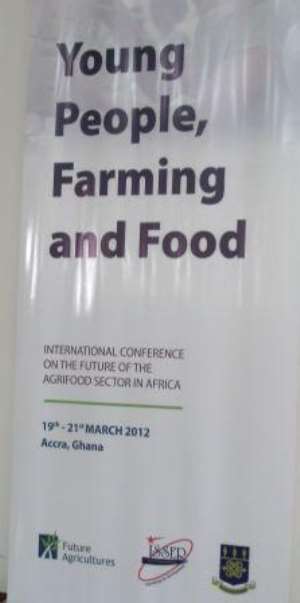
Youth engagement in agricultural policy dialogue is one critical issue emerging at the ongoing international conference on the future of the Agrifood sector in Africa.
How should the youth be involved in policy formulation processing? Divergent views have emerged from discussions.
According to Dr. Samuel Kojo Dapaah, a Special Advisor to Ghana's Minister of Food and Agriculture, the youth should be better off so long as their concerns with agric mechanization, transportation, water and other basic amenities are provided.
For him, these provisions are more critical than bringing young people to directly engage in policy dialogue and policy formulation.
The view is however challenged by Dr. Namanga Ngongi, President of the Alliance for a Green Revolution in Africa (AGRA), who believes there should be new ways to having youth express their views collectively in policy formulation.
AGRA has an initiative which helps governments build their policy-making capacity and formulate appropriate agricultural policies.
One of its key components is the creation of national policy hubs which bring together analysts, government officials and representatives from farmer groups, civil society, and the private sector to define priorities and develop policies that benefit smallholder farmers and others key players along the agriculture value chain.
Dr. Ngongi said such policy hubs should have youth representation to offer them the platform to articulate their opinion in agriculture policy formulation.
The Accra conference on young people, farming and food has as one of its key messages on the need for research and policy to take full account of social differences among young people.
FANRPAN's Sithembile Ndema Mwamakamba has been speaking on the theme “Advocating for active engagement of the youth in agricultural policy development”.
Her organization, the Food, Agriculture and Natural Resources Policy Analysis Network (FANRPAN) has been exploring opportunities for the youth – students, farmers, researchers and other youth-based organizations – to actively engage in the food value chain.
Ms. Mwamakamba noted that youth knowledge in ICT and new media can be harnessed for the development of agriculture, especially in the Comprehensive Africa agriculture Development Programme (CAADP) and issues of climate change.
She however observed that engaging the youth in policy dialogue will first involve documenting the evidence of youth involvement in agriculture.
For now, FANRPAN is committed to changing negative attitudes and perceptions on how the young people engage with the agri-food sector as producers, entrepreneurs, employees, consumers and citizens.
Story by Kofi Adu Domfeh/Luv Fm/Ghana




 Elisu By-election: "If you call yourself a man, boo Chairman Wontumi again" — Bo...
Elisu By-election: "If you call yourself a man, boo Chairman Wontumi again" — Bo...
 Fuel tanker driver escapes with his life after tanker goes up in flames near Suh...
Fuel tanker driver escapes with his life after tanker goes up in flames near Suh...
 Uniform change: ‘Blue and white are brighter colours’ — Kwasi Kwarteng explains ...
Uniform change: ‘Blue and white are brighter colours’ — Kwasi Kwarteng explains ...
 MoE not changing all public basic school uniforms but only newly built ones — Kw...
MoE not changing all public basic school uniforms but only newly built ones — Kw...
 We’re only painting new public basic schools blue and white – Dr. Adutwum clarif...
We’re only painting new public basic schools blue and white – Dr. Adutwum clarif...
 Bawumia has lost confidence in his own govt’s economic credentials – Beatrice An...
Bawumia has lost confidence in his own govt’s economic credentials – Beatrice An...
 I fought WW2 at age 16 – WO1 Hammond shares At Memoir Launch
I fought WW2 at age 16 – WO1 Hammond shares At Memoir Launch
 GRA-SML deal: Regardless of what benefits have been accrued, the contract was aw...
GRA-SML deal: Regardless of what benefits have been accrued, the contract was aw...
 April 26: Cedi sells at GHS13.75 to $1, GHS13.18 on BoG interbank
April 26: Cedi sells at GHS13.75 to $1, GHS13.18 on BoG interbank
 Champion, promote the interest of women if you become Vice President – Prof. Gya...
Champion, promote the interest of women if you become Vice President – Prof. Gya...
